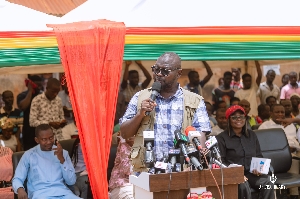Opinions of Tuesday, 1 April 2014
Columnist: Okao, Jackie
Are we Being Economical with the Truth ...
... about The Economic Partnership Agreement?
The government of Ghana is confronted with a very important decision about the Economic Partnership Agreement (EPA). While economists and policy analysts continue to debate the effects of the agreement on the economy, particularly on local production, we should take time to consider the civil society view and assess the impact of the EPA on the poor and the economically excluded in our society, especially the peasant farmers.
I recently visited a number of shopping centers in Accra to buy local Ghanaian chicken, as they taste better than the imported variety. Shopping for bargains in Accra could be a difficult adventure, especially when you live in a cosmopolitan area. After moving from store to store, I couldn’t get one to buy. I decided to try the local markets, hoping to buy a live chicken but it was thrice the price of the ones in the flashy shopping centers.
Thinking through the experience, I questioned why the imported chicken is a lot cheaper than the local ones? What implications does it have for the country, especially the small holder farmers who are engaged in poultry farming, as it is very common that often most people will opt for what is cheaper. Presently, Ghana is looking at ratifying a full Economic Partnership Agreement (EPA) after the implementation of an interim agreement, where Ghana liberalized 80% of her market to the European Union (EU) and was therefore able to access the EU market with her products. The Economic Partnership Agreement between the European Union and African, Caribbean and Pacific (ACP) countries has been fraught with disagreement since it was initiated over ten years ago. While the EU hails the agreement as a new form of partnership that will promote economic growth and poverty reduction in ACP economies , the countries especially members of the civil society remain skeptical about the impact that EPAs will have on their developmental priorities, particularly smallholder agricultural development, government revenues, unemployment, poverty, and food security.
Following strong opposition to the original EPA by African countries, the EU introduced an interim EPA in 2007. Only four (4) out of the 47 eligible African countries have ratified an interim EPA. In West Africa, Ghana and La Cote d’Ivoire remain the only countries from the Economic Community of West African States (ECOWAS) to have initialed the interim EPA as of 2012. Notwithstanding many other negative implications, Free Trade Agreements preceding the IEPA have contributed to the collapse of the smallholder agricultural sector, particularly the poultry sector. This broadly explains the why the price of imported chicken is more than half the price of the local ones. The result is that the local producers would be outcompeted by the forces of demand and supply in the market place. By dedicating 2014 to agriculture, the African Union has reaffirmed the Maputo declaration 2003 on Agriculture and Food Security, and the 10 percent national budget allocation to agricultural development. Out of 49 countries in sub-Saharan Africa, only seven, including Ghana have consistently reached the 10 percent target, Currently, Ghana allocates between 9-10% of its budget spending on agriculture. This, however, has not been felt by the peasant farmers who form majority of the population because of various factors including the stiff and unfavorable competition brought about by agreements such as the IEPA. Even though government is looking at favorable trade as well as widening the tax base by encouraging more investments in the country, there should be more strategic consultation on the economic and investment decisions taken on to prevent a worse economic situation. As agriculture continues to remain a backbone of many African countries, including Ghana, sound policies and programmes should be put in place, to ensure that the subsistence farmer is supported to be competitive on the market. Personally, I am very pleased that the West Africa Trade and Finance ministers refused to endorse the position reached by the ECOWAS Commission and the EU on the EPAs, Rather, demanded a consultation with key stakeholders such as civil society and private sector among others at the national levels before any decision can be taken.
It is heartwarming that Ghana has another chance to take a more detailed look at the EPA. The government should therefore consider working with ECOWAS to renegotiate the terms of the full Agreement as a bloc, to maximize the benefit of EU market access while minimizing the cost of EPA on the economy. This will enable Ghana export products for good profit. Government should not limit the opening of its market alone, but tighten the West African market as well, to low-priced EU imports. These strategies would promote trade while consciously protecting the local producer.
By Jackie Okao: The writer is a Policy and Advocacy Advisor with Actionaid Ghana, Accra












